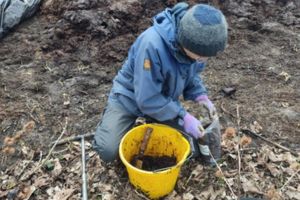Farmers explore fermentation to boost manure quality and cut emissions
Scottish livestock farmers are exploring a little-known method, fermentation of manure, in the hope it will boost farm productivity and slash emissions, in a new Innovative Farmers field lab.
|
Farmers on two sites are trialling Bokashi, developed by Japan’s Professor Teruo Higa, which uses a mix of microorganisms to ferment animal bedding and dung, covered and left for six to eight weeks.
Cattle waste is typically stacked outdoors, uncovered, which can emit ammonia, methane, carbon dioxide and nitrous oxide, and lose potassium, phosphorus and magnesium. As it dries out, it reduces in size and becomes harder to handle.
The three-year trial will measure concentrations of these gasses and nutrients as the fermentation takes place. Separately, farmers will observe how easy it is to apply the treated manure, and any changes to the fertilised fields.
It is hoped that Bokashi can reduce these losses, resulting in lower emissions and more valuable, nutritious manure that’s easier to spread.
Triallist Andrew Barbour of Fincastle Farm, a cattle and sheep enterprise based in Glen Fincastle, said: “We want to improve our soil health, make sure we don't lose nutrients and reduce our carbon footprint.
“There’s a clear difference early on. The Bokashi-treated manure smells sweeter, less like ammonia, and is broken-down better.
“The effort involved using Bokashi is very low – half an hour at the start and at the end – but we’ll save time later if it’s easier to handle and available earlier.
“If we’re successful we could see significant productivity increases from the grass as well as the environmental benefits, so it’s a win for everyone involved.”
Farming for the future
Bokashi has been used effectively by farmers in South-West England for several years, and trialling it in colder conditions will boost the existing body of evidence.
The Scottish farmers are developing effective systems for using Bokashi on farms, allowing future farmers to adopt these practices and provide additional research.
If the advantages turn out to be significant, it could lead to Bokashi being used across the UK.
Earthcare Technical Director Audrey Litterick, coordinating the field lab, said: “The management of farmyard manures can involve a lot of cost if you’re to end up with high-quality material.
“You can easily lose about half of the mass in a dung pile over a year-long outdoor stacking period and a great deal of valuable organic matter, nutrients and carbon if you compost it.
“Anything that reduces farmers reliance on bought-in fertilisers – the production of which often relies heavily on fossil fuels – is a huge boost to farm resilience.
“The trials so far look promising – Bokashi looks like a better way to go.”
Innovative Farmers Coordinator Laura Gude said: “We’re excited to see farmers take the lead on Bokashi research – their work could benefit any UK livestock farmer.
“The impact of techniques like this are still not widely known and the research is genuinely groundbreaking.
“We hope this inspires other farmers to try these nature-friendly methods.”
All results from the field lab will be made available open source. For updates and more information on the trial, visit the Innovative Farmers website. |
- Log in to post comments



